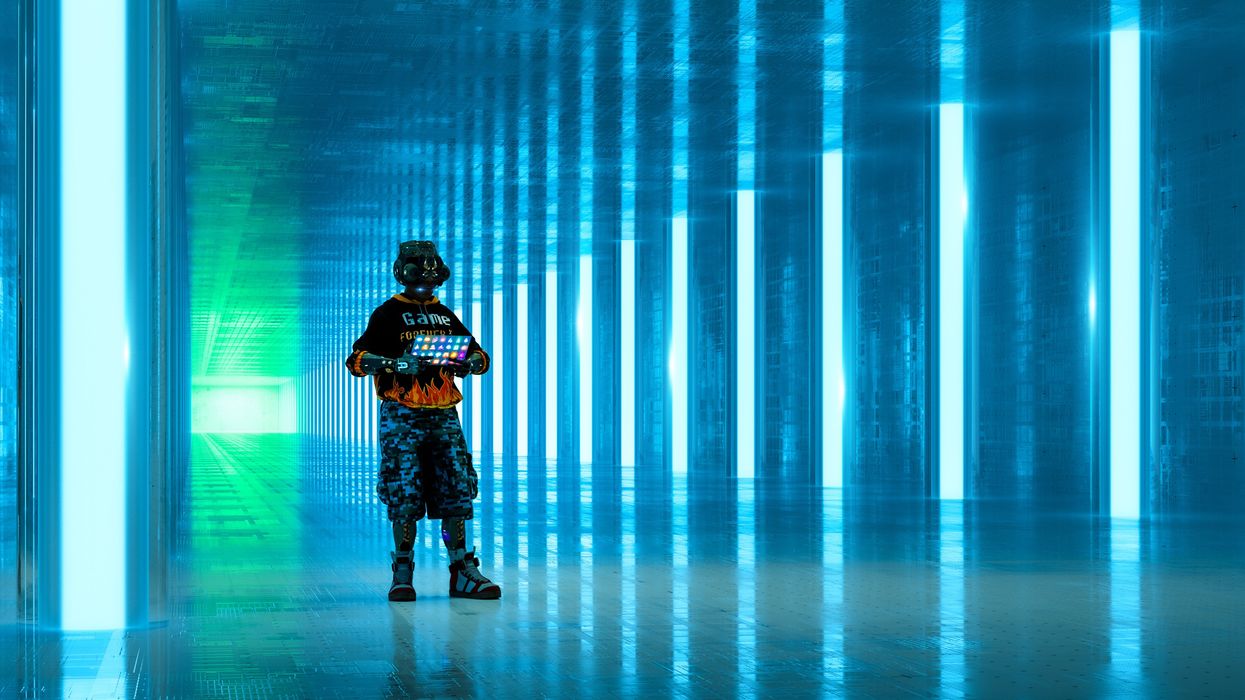
gremlin/Getty Images

The future looks like slavery to augmented reality at the expense of the real world.
On a recent unseasonably warm day in the Northeast, I found myself alone, contemplating society’s relationship with technology while observing people on a beach. My heart sank at what I saw.
Watching families gathered together, more parents and kids than not had their eyes plastered to their phones. Instead of looking out upon the water or spending time playing frisbee or catch with each other, I spotted children crouched on the sand with their backs to their parents engaged with their phones while mothers and fathers stood doing the same.
Our screens are raising our kids, advancing a growing authoritarianism over our kids’ lives by a small number of companies.
They defeated the purpose of going to the beach on every possible level. They could have simply stayed home.
Our society is losing the fight with screens.
Artificial intelligence seems to agree, ironically. And since so many put more credence in AI than in their own eyes, maybe it will help people truly realize where society appears to be headed.
In a recent video, AI shows multiple illustrations of what it believes children looked like from 1800 through today and beyond. Watch and be stunned at how accurate it is historically … which doesn’t bode well for kids or humanity’s future.
Here's how AI perceives our kids through generationswww.youtube.com
The Connect Kids report by Childwise supports this view, suggesting that today's youth can scarcely imagine a world without the internet. Technology is their way of life, but is it a happy and healthy way of life?
Can you view the video and say we’re progressing as a society? I can’t. Especially when children are spending half the time outdoors that their parents did. They are more depressed and lonely than the Greatest Generation (ages 72 and over). They are becoming increasingly disconnected from nature.
It’s tough to raise kids to be stewards of the environment when they don’t develop a meaningful connection with it in childhood. A recent Cornell University study found that “those individuals who participated in activities such as camping, hunting, fishing, hiking, and playing in natural areas before the age of 11 were more likely to demonstrate pro-environment attitudes and behaviors as adults.”
The difference between physical outdoor play and virtual interaction is stark. The University of Michigan reports that the average American child spends a mere seven minutes per day in unstructured outdoor play, a decline from the two hours daily and an additional nine hours on weekends reported in the 1970s and '80s. I can’t even brush my teeth and comb my hair in seven minutes!
Beyond the health and welfare outdoor play provides, kids benefit from this type of socialization. It also provides treasured memories a screen can’t give them.
To that same end, too much screen time has proven to impact children’s creative thinking and problem-solving abilities. It also harms the development of social skills, which follows them for a lifetime.
The increased anxiety fosters discomfort with inactivity and quiet as well. Our kids simply don’t feel comfortable not doing something all the time. That’s a type of pressure earlier generations never had to cope with. We might have had moments where we wanted something to do to alleviate boredom, but we didn’t need something to do. That sounds more like an addiction.
You would think that parents could simply turn this nonsense off and tell their kids, “That’s enough.” But plenty of parents feel almost powerless to do so given how fundamental screens have become to children’s overall lives operationally, including their school lives. Plus, many parents use screens to help manage their households and babysit. But at what cost?
The question isn’t merely rhetorical. According to MacRumors, Apple sold 200,000 Vision Pro units by January 30, 2024, since the “augmented reality” device became available for pre-order on January 19, 2024. Consider that families are struggling to make ends meet in this economy, and yet plenty found the money to purchase an Apple Vision Pro headset at $3,500 a pop. Make that make sense to me, especially given the evidence.
“By the time a child reaches seven,” National Geographic reports, “he or she will have spent two and a half times as long sitting alone in front of a screen than engaging in outdoor play.”
Sitting alone.
No wonder they prefer to create a barrier around themselves and their phones when spending time with their families at the beach. Our screens are raising our kids, advancing a growing authoritarianism over our kids’ lives by a small number of companies. And we are allowing this to happen, condemning them to live their lives in silos attached to devices that promise them a better life but ultimately fail to deliver.
“I just think we are at a fork in the road and we can’t keep going down the road we have been on,” says the creator of the video embedded above. “Go outside. Put down the devices. This is crazy. We don’t want Skynet to become reality. … This is not normal. This is not what life is supposed to be like. Let’s get out of upside-down land right now.”
I agree. Take the devices away and push your kids into the back yard. It made a great babysitter for us, and it will serve them well, too.
Laura Wellington